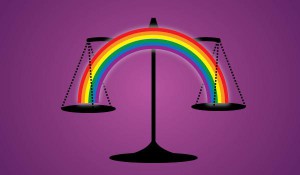
On 7 February 2012, the United States Court of Appeals for the Ninth Circuit delivered its judgment in Perry v Brown. The case concerned California’s adoption of Proposition 8, which amended the State’s constitution to prevent the Californian state from recognising the union of same-sex couples with the designation “marriage”. The Court found that Proposition 8 violated the Equal Protection Clause of the US Constitution.

7. Februara 2012, Apelacioni Sud Sjedinjenih Američkih Država za deveti okrug američkog vrhunskog apelacionog suda donio je presudu u slučaju Perry protiv Browna. U pitanju je slučaj usvajanja Prijedloga 8, koji bi izmijenio i dopunio Ustav države i tako bi spriječio državu Kaliforniji da ne prepozna jedinstvo istopolnih parova s oznakom „brak“. Sud je utvrdio da je Prijedlog 8 povrijedio Klauzulu jednake zaštite američkog Ustava.
In reaching its decision, the Court of Appeals considered only whether the Equal Protection Clause protects minority groups from being targeted for the deprivation of an existing right without a legitimate reason and whether the People of California had such reasons.
In analysing the impact of the provision, the Court emphasised “the extraordinary significance of the official designation of ‘marriage’”, which is “the principal manner in which the State attaches respect and dignity to the highest form of a committed relationship and to the individuals who have entered into it”. In taking away the designation of “marriage” the People of California took away “the societal approval that comes with it”.

The Court found that Proposition 8 did not serve any of the state interests put forward by its sponsors, and expressly rejected the argument that denying same-sex couples the right to call themselves “married” could bolster the stability of families headed by one man and one woman:
The argument that withdrawing the designation of “marriage” from same-sex couples could on its own promote the strength or stability of opposite-sex marital relationships lacks any (…) footing in reality.
In the absence of any legitimate purpose for Proposition 8, the court was left with “the inevitable inference” that the disadvantage imposed by it was born out of disapproval of gays and lesbians as a class. Its effect was to “send a message that gays and lesbians are of lesser worth as a class – that they enjoy a lesser societal status”. The Court concluded that “Proposition 8 enacts nothing more or less than a judgment about the worth and dignity of gays and lesbians as a class” and that disapproval of a class of people cannot constitute a legitimate government interest.
To read a case summary of Perry v Brown click here.
To read the judgment in Perry v Brown, click here.
Source: The Equal Rights Trust
Pri donošenju svoje odluke, Apelacioni sud smatra da li Klauzula jednake zaštite štiti manjinske grupe od toga da bude usmjeren za lišenje postojećeg prava bez opravdanog razloga i da li narod Kalifornije imaju takve razloge.
U analizi odredbi, Sud je istakao da je „izuzetan značaj službenom oznakom ‘braka'“, koji je „glavni način na koji država iskazuje poštovanje i dostojanstvo za najviši oblik i čin odnosa prema pojedincima koji su ušli u taj odnos „. Oduzimanjem oznake „brak“ stanovnici Kalifornije oduzeli bi „društveno odobrenje koje dolazi s njim“.

Sud je utvrdio da Prijedlog 8 ne služi bilo kojem državnom interesu, a izričito je odbio argument da bi uskraćivanjem prava istospolnim parovimam, da se njihov odnos naziva „brak“, mogao da podupre boljoj stabilnosti porodice koji čine jednog čovjeka i jednu žena:
„Razlog da povlačenje oznake „brak“ istospolnim parovima može kao takvo poboljšati snagu ili stabilnost heteroseksualnih odnosa u braku u nedostatku bilo koje (…) osnove u stvarnosti.“
U nedostatku bilo kojeg legitimnog cilja za Prijedlog 8, Sud je ostao pri „neizbježanim zaključkom“ da je nedostatak upravo taj kod odbijanja homoseksualaca i lezbijki kao klase. Njegov učinak bio je „poslati poruku da homoseksualci i lezbijke imaju manje vrijednosti kao klasa – i da oni uživaju manji društveni status“. Sud je zaključio da „Prijedlog 8 donosi ni manje ni više nego od osuđivanja vrijednosti i dostojanstva homoseksualaca i lezbijki kao klase“, te da odbijanje/neprihvatanje grupe ljudi ne mogže biti opravdani državni interes.
Da biste pročitali slučaja sažetak Perry protiv Browna kliknite ovdje.
Da biste pročitali presudu Perry protiv Browna, kliknite ovdje.
Izvor: The Equal Rights Trust
